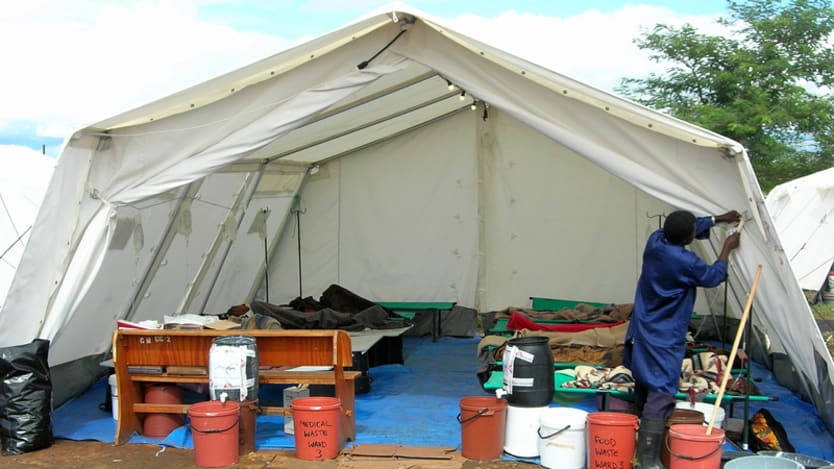Push to contain Zimbabwe cholera outbreak ahead of rainy season

ABIDJAN — In Harare, the capital of Zimbabwe, government officials have banned street food sales, and humanitarians are performing skits in an effort to sensitize populations and control a cholera outbreak that has so far claimed 38 lives, as the country also struggles with typhoid.
The cholera outbreak was declared in early September in the capital city of 2 million. Within weeks, the number of cases skyrocketed. As of Sept. 20, 5,404 suspected cases have been reported, including 81 confirmed, mostly originating from high-density suburbs.
“It is a cause of concern to have a cholera outbreak in the capital city considering that, with a largely mobile population, we have some cases reported elsewhere and it also signals that we do not have access to safe water and adequate sanitation,” Anderson Chimusoro, disease prevention and control officer at World Health Organization Zimbabwe, told Devex.
The appearance of cases in at least 12 other districts across the country has led to national communication campaigns to inform residents of symptoms and prevention methods. Health messages around drinking safe water, handwashing, and proper food preparation have been delivered via mobile phone providers.
“We are sure that we are reaching the population both here in Harare and outside because everyone agrees that the entire nation is possibly at risk and should receive messages about cholera prevention and control,” Chimusoro said.
Why governments tiptoe around the word 'cholera'
Some governments refuse to acknowledge cholera outbreaks in their country, leaving the humanitarian actors working to respond to the health crisis on a political tightrope.
WHO has reposted country-level staff to support teams stationed in the capital and is assisting the Ministry of Health and Child Care with surveillance and contact tracing, as well as with on-site trainings and case audits in laboratories and health clinics to improve case management.
Cholera is usually spread through water or food sources that have been contaminated by the fecal matter of an infected person. The disease most commonly spreads in places with poor sanitation and inadequate water treatment, such as conflict zones, famine-affected areas, or overcrowded neighborhoods.
Zimbabwe’s dilapidated sewage systems and the mishandling of waste has led to inadequate access to safe water and sanitation within high-density neighborhoods.
Efforts to contain the outbreak by forbidding the sale of street food has received pushback from many local residents who use the income to provide for their families. Authorities also banned public gatherings in an effort to minimize the spread of this highly-contagious disease.
“The government of Zimbabwe has moved in quite significantly trying to manage waste management issues and remove waste in and around the city,” Zimbabwe Red Cross Operations Director Karikoga Kutadzaushe explained. “But there must also be an element that looks at, as the city is growing, how does the government avail more resource for waste management and sewer networks?”
As WHO told Devex, the caseload seems to be plateauing, the Red Cross operations director hopes that collective efforts will quickly get a handle on the outbreak ahead of the rainy season.
Kutadzaushe said responders lack enough fluids to both rehydrate cholera patients and ensure that nearby residents have sufficient safe water. “We need more tablets to chlorinate water and ... communities to acknowledge that there is nothing better than to use the tablets with the boiled water,” he added.
WHO said they are expecting an “expedited shipment” of oral cholera vaccines and kits with rehydration solutions, IV fluids, protective equipment, and clothes for health workers to arrive soon.
Typhoid, another disease stemming from unclean water, has also affected more than 1,500 people and killed at least 10 in Zimbabwe within the past month. WHO has asked caseworkers to report cholera patients presenting high temperatures for typhoid testing.
“This has not proved to be a big issue, but in terms of case management we have to remain vigilant so that we don’t miss [typhoid] cases in this cholera outbreak as well,” Chimusoro said.
In 2008, during the country’s worst cholera outbreak, more than 100,000 fell ill and some 4,000 died.
“In the intermediate term, in certain settlements, which may not have been properly planned, the government needs to move in quickly and install safe water supplies and proper sanitation facilities, and in areas where there is water supply [it needs to] increase availability of clean water and capacity,” the WHO officer said. “Making sure the sewage system is fully functional is key, so [that means] sewer system rehabilitation to ensure any blockages or spillages are addressed.”
Search for articles
Most Read
- 1
- 2
- 3
- 4
- 5
